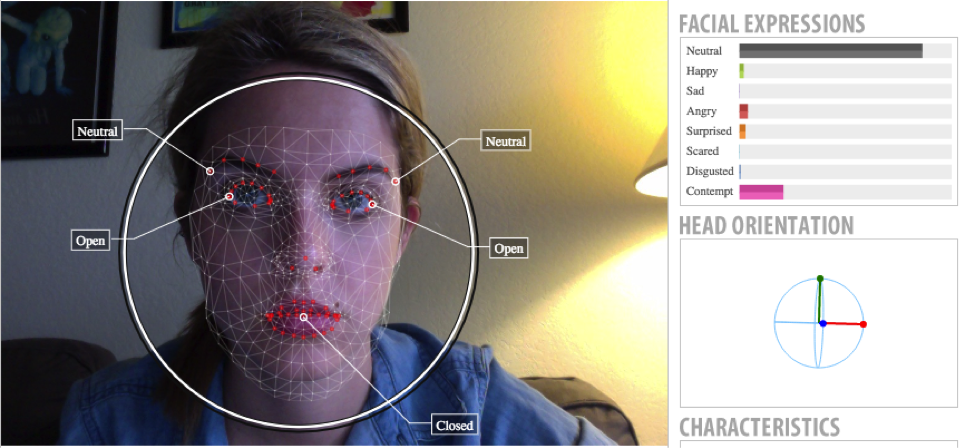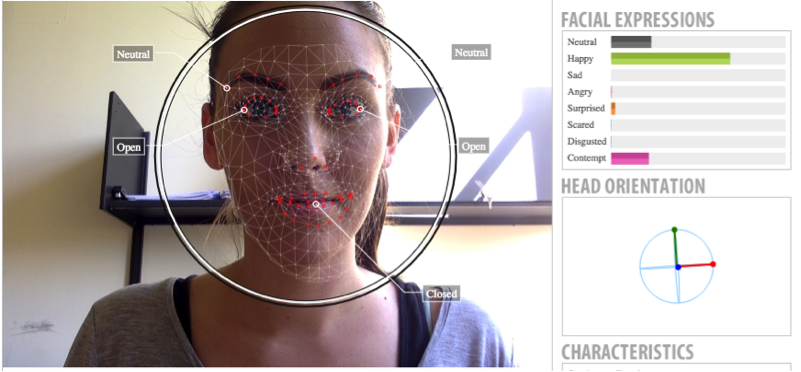Kristen Stewart. Her Majesty the Queen. The cartoon character Daria. Yours truly. What do we all have in common? We suffer from RBF, or Resting B*tch Face. This means that when we are just relaxing and being ourselves, others tend to perceive our faces as judgmental or even menacing. But is RBF just a funny Internet meme, or can science give us an insight into what is going on?
To see for myself, I used this web page by Noldus that was recently featured in several news outlets for its ability to analyze facial expressions. I uploaded a picture of myself to test for RBF. As you can see, while mostly neutral, my face has elements of contempt.

So how does it “know”? The program is based on decades of research on emotion and facial expressions by psychologist Paul Ekman and his colleagues. It uses the Facial Action Coding System (FACS), which identifies facial muscle movements to objectively describe and quantify facial expressions.
When RBFs are analyzed, the software detects asymmetrical activation of the zygomaticus major and contraction of the buccinator, both muscles that control cheek movements. In other words, the software is picking up on traces of the emotional expression of contempt, according to Drs. Jason Rogers and Abbe Macbeth. While this software is not able to determine the underlying emotions we have, it is able to pick up on muscle groups that might be sending the wrong message.
Next, I asked a female colleague (who is often accused of RBF) to see if the software detected the same thing. Her resting face actually shows a lot of happy, but still a sizable portion of contempt. How unfair!

Contempt is an emotion similar to anger and disgust, but it is usually directed toward someone of lower status or is lacking some valued dimension, like honesty or humility. For instance, it’s the feeling you might have when you read about Trump’s latest xenophobic remarks, or when your ex is bragging about his band on Facebook again. Nevertheless, as psychologist John Gottman’s research has shown, contempt is one emotion that can be toxic in relationships and is a powerful predictor of marriage dissolution.
Beyond claims that RBF may be sexist, as most of the afflicted are female, RBF might have real consequences. For example, social connections are a stronger predictor of mortality than smoking, physical activity, or BMI. Being able to form strong friends and social networks is critical to well-being and health. If people with RBF are more often seen as unkind, it is possible that potential friends may be more reluctant to reach out. Of course, RBF doesn’t mean no BFFs, but it is possible that RBF can negatively affect first impressions or daily interactions. If you or someone you know has RBF, please share your experiences in the comments below!
Peer edited by Alisha Coffey.
Follow us on social media and never miss a Weird Science article:
I’ve been told I have RBF a few times, and I always hoped people were joking because I think I’m quite friendly. Now I finally know that I do actually have RBF. Definitely don’t like that this could be impacting someone’s first impression of me!
My kids frequently used to ask me ‘why are you mad?’ Reasonable assumption, if you know my kids, but it was just RBF.
Ha, this was really fun. I was surprised by how accurate the tool was when it came to me trying to solicit the emotions it looks for.